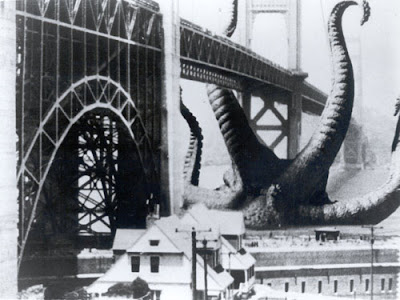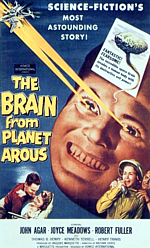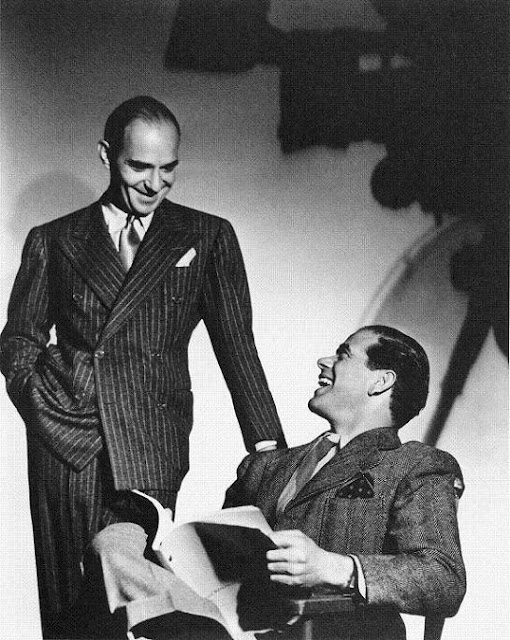Showing posts with label writing. Show all posts
Showing posts with label writing. Show all posts
Sunday, March 26, 2017
OPENING PARAGRAPHS
Don't you love the way the best magazine writers used to begin their stories? How do you like this opening:
"The floor beneath Conners' feet dropped like a gallows trap. What had been solid, shining mahogany was suddenly a gaping black void. The man shot through space. Down, down, into the darkness below.
The native servants stood blandly silent. From the opening in the floor came a thump then, after a moment, a horrible scream of terror, that echoed ominously through the room like a banshee's wail.
'For God's sake take me out of here! What is this thing? God, it's coming close to me!" It's----' "
Very nice. I'll bet nobody ever stopped reading after an opening like that.
How 'bout this one:
"Night, black and rain-swept, shrouded the Kirty Institute for the insane. Gusts of howling wind attacked the ugly gray buildings like seas pounding some bleak, rocky coast. There was the same impression of desolation, of a savagely forbidding place that humans shunned."
"A small car lurched to a stop in front of the guardhouse at the gate. Two men got out, collars upturned, hats pulled low."
Nice. Very nice.
Of course you could argue that the best openings were the most brief. Here (below) the writer grabbed our interest with just a few words:
"Sally, take that child away. Don't put it down in the dirt."
Huh? The dirt!? Yikes! What the heck was that story about? I found it excerpted in, of all things, a book about grammar, so I have no idea what the context was.
Ah, giants walked the Earth in those days!
Saturday, June 04, 2016
HOW SHAKESPEARE SETS UP A SCENE
I've often thought that modern screen writers take too much time to set up a scene. They're too wedded to realism, where everything takes forever to do. To make my point I thought I'd compare two versions of a classic scene that everybody's already familiar with, and what could be more classic than the famous balcony scene in "Romeo and Juliet?"
You know the story. Here's how a modern screen writer would write the same scene:
A doorbell rings. It rings long enough for the maid in another part of the house to hear it. She drops what she's doing and answers the door. Romeo identifies himself, says what he's come for. The maid invites him in and offers to see if Juliet is home. The frightened Romeo steps inside and sits down, maybe wishing he'd never come. Juliet unexpectedly appears on the stairs as Romeo looks around the room. She dismisses the maid and greets Romeo.
Romeo offers to go and Juliet says its not that late yet. Romeo sits down again, thoughtfully picking at lint balls on his socks. In and around the small talk there's little meaningful glances between them. Finally Romeo takes her hand.
Well, it goes on.
Here's (below) how Shakespeare set up the same kind of scene:
"But soft, what light through yonder window breaks?"
'Nuff said.
Friday, October 03, 2014
BEGINNING A STORY
I've been reading some pulp-type stories and I thought it might be fun to discuss the first paragraph of one of them. I liked it so much that I whipped out an index card and quickly wrote my own bad version of it so I'd have something to compare it to. I say "quickly" because if I'd taken time to think about it I'd likely have repeated what I'd just read. I wanted to see how my own brain spontaneously organized the same facts the pro had to work with.
So here's (below) my clunky version.....
"Jane startled to wakefulness when she heard sounds on the staircase outside the bedroom door. 'Bill! Wake up! Someone's in the house,' she exclaimed, but her husband wasn't there. Could it be him making the sounds? Hesitatingly she got out of bed and pressed her ear to the bedroom door."
I know, I know...it sounds like an accountant wrote it. Okay, here's (below) the pro version....
"Laura Standish blurted out her husband's name before she was fully awake. "Frank!" But there was no answer. Even before she realized just what it was that had awakened her, a chill little quiver of dread brushed her spine."
That's it...simple and elegant! So what are the differences? Exactly how did the pro make me look so stupid?
Well, for one thing he gave the woman a likable, dignified name that made me care about her. For another the pro had her utter only one word: "Frank." There was no need to go on about somebody being in the house. It was implied.
There's also no need to have her reason out that Frank might have made the sounds. It's too early for that. Her first thought after calling for her husband and getting no answer would be one of animal terror. Besides, terror creates a better mental picture than sleuthing does.
Last but not least, is the issue of euphony or whatever you want to call it. I had the woman "exclaim." The pro had her "blurt out." I also like the sound of "little quiver of dread that brushed her spine." This writer is alternately lean and ornate. It's a combination that works. And "brushed her spine"...what an interesting image!
Hmmm...did I leave anything out? If so, let me know.
Friday, August 29, 2014
WRITTEN WHILE SLEEPY
Forgive me, I'm writing a blog when I'm very, very sleepy again, and I'm way too groggy to write anything thought out. I'll try to free associate and see what happens.
Well, I've been obsessively repeating the name of a library film I saw recently: "Tinker, Tailor, Soldier, Spy." Isn't that a beautiful combination of words? I think it's from an old jump rope song which goes:
Rich man, poor man,
Beggar-man, thief,
Tinker, tailor,
Indian chief.
...or something like that. English is such a beautiful language. Speaking it is like playing a Stradivarius. What do you think of the sound of this poem (below) by Auden?
The reader's voice (above) is a little indistinct but she makes up for it by striking exactly the right emotional tone. I wish I could hear her read more.
I'm currently writing a long-format story outline and the sound of words has been on my mind. I don't have a very good ear for the sound of words, at least not when I'm writing my own. I try to make up for it by having something interesting to say, but that doesn't always work. How can you hear Auden's poem and come away thinking that the sound of words doesn't matter?
Lately I've been thinking about what subjects are easiest to write good dialogue for. So far I have: arguments, bragging, threats, enumeration and love scenes. Absolutely nothing in the world is easier to write than an argument, but you have to be careful lest it devolve, Monty Python-like, into simple contradiction. I hate dialogue like:
HENRY: "Pass the potatoes."
BILL: "Whaddaya you want the potatoes for? They're fattening."
HENRY: "What do you care why I want them? Gimme the potatoes!"
BILL: "I'm just saying."
HENRY: "I'm gonna count to ten."
You could have the characters talk like that all day, but in the end what have you got? Just simple contradiction. But that kind of dialogue is seductive 'cause it's easy to write and easy to act. Even John Patrick Shanley (the writer of "Moonstuck") uses it. He did it in "Beggars at the House of Plenty."
A long time ago I saw a couple of Ibsen plays and was unable to understand why he was so popular with actors. Maybe now I get it. For one thing he writes scenes that highlight the performance. For another he writes dialogue where the speaker frequently seems to change his mind or have revelations in mid-sentense. I guess actors like the unpredictability and emotional fireworks. I'm a comedy guy so that technique isn't very useful to me, but...you never know.
Okay, that's it.
Well, I've been obsessively repeating the name of a library film I saw recently: "Tinker, Tailor, Soldier, Spy." Isn't that a beautiful combination of words? I think it's from an old jump rope song which goes:
Rich man, poor man,
Beggar-man, thief,
Tinker, tailor,
Indian chief.
...or something like that. English is such a beautiful language. Speaking it is like playing a Stradivarius. What do you think of the sound of this poem (below) by Auden?
The reader's voice (above) is a little indistinct but she makes up for it by striking exactly the right emotional tone. I wish I could hear her read more.
I'm currently writing a long-format story outline and the sound of words has been on my mind. I don't have a very good ear for the sound of words, at least not when I'm writing my own. I try to make up for it by having something interesting to say, but that doesn't always work. How can you hear Auden's poem and come away thinking that the sound of words doesn't matter?
Lately I've been thinking about what subjects are easiest to write good dialogue for. So far I have: arguments, bragging, threats, enumeration and love scenes. Absolutely nothing in the world is easier to write than an argument, but you have to be careful lest it devolve, Monty Python-like, into simple contradiction. I hate dialogue like:
HENRY: "Pass the potatoes."
BILL: "Whaddaya you want the potatoes for? They're fattening."
HENRY: "What do you care why I want them? Gimme the potatoes!"
BILL: "I'm just saying."
HENRY: "I'm gonna count to ten."
You could have the characters talk like that all day, but in the end what have you got? Just simple contradiction. But that kind of dialogue is seductive 'cause it's easy to write and easy to act. Even John Patrick Shanley (the writer of "Moonstuck") uses it. He did it in "Beggars at the House of Plenty."
A long time ago I saw a couple of Ibsen plays and was unable to understand why he was so popular with actors. Maybe now I get it. For one thing he writes scenes that highlight the performance. For another he writes dialogue where the speaker frequently seems to change his mind or have revelations in mid-sentense. I guess actors like the unpredictability and emotional fireworks. I'm a comedy guy so that technique isn't very useful to me, but...you never know.
Okay, that's it.
Labels:
dialogue,
euphony,
ibsen,
sound of words,
writing
Tuesday, August 17, 2010
FILLER
 |
I hate filler. I hate it in books, cartoons, films, food...you name it. Filler sucks.
|
Sunday, July 19, 2009
THE OTHER POTTER

"It's a Wonderful Life": the film is falling out of favor lately, largely because it's been on the vintage favorites list for a long time and people are looking for something new. Too bad, it's a great film. Anyway, I brought it up because I want to talk about one of my favorite sequences in the film, the one where Potter tries tries to buy off George Bailey with the promise of a high-paying job.
It's an interesting sequence because Potter's been treated as a one-note villain up to this point so you'd expect him to play the sequence in a high-hatted, "Take this offer or else!" kind of way. Instead Potter uncharacteristically tries to sweet talk Bailey. Watch the clip. It begins 4 1/2 minutes into the video.

Did you watch it? What intrigues me about this is that it's a simple attempt at bribery that doesn't add anything to the story, yet it manages manages to be one of the best scenes in the whole film. Think about it. We already knew that Bailey and Potter were enemies. We already had abundant evidence that Bailey preferred integrity to money. The sequence tells us nothing new, and yet....


What I'm going to argue here is that the sequence exists for a theatrical reason. Up till now the Potter part of the story simply laid down information. It took great pains to let us know who the good and bad guys were. That's fine so far as it goes, but live theater people know that audiences crave scenes where they can boo the villain...where they're tempted to yell, "Don't go in there, Dick! he's got a gun!" Even in the middle of a story, they want sequences that end with the patriotic triumph of right exemplified with angelic choirs waving the flag and the villain being hissed off the stage.


Not only that, but actors need scenes where they can shine and not simply be pawns racing ahead to the next plot point. In this sequence Barrymore gets to be sunny for a while. This means he can anchor his performance in a deliberately insincere sing-song, which live audiences love to re-act to, and actors love to play.
Labels:
acting,
acting theory,
cyrano,
cyrano de Bergerac,
melodrama,
plot,
screenwriting,
wonderful life,
writing
Thursday, May 14, 2009
LESTER DENT'S ADVICE TO WRITERS

I covered this subject before but here's a fuller and more satisfying version of pulp writer Lester Dent's famous advice to writers, written...when...in the 50s? Even if you've seen this before it's worth re-reading, and if you haven't seen it, then it'll surely strike you as a revelation, the way it struck me.
Some of the books presented here claim to have been authored by Kenneth Robeson, but Robeson was the pen name of Lester Dent. Dent wrote a zillion Doc Savage novels, but he didn't invent the character, his publisher and editor did. Anyway here's the timeless advice of Lester Dent to short-form adventure writers everywhere.
No yarn of mine written to the formula has yet failed to sell.
The business of building stories seems not much different from the business of building anything else.
Here's how it starts:
1. A DIFFERENT MURDER METHOD FOR VILLAIN TO USE
2. A DIFFERENT THING FOR VILLAIN TO BE SEEKING
3. A DIFFERENT LOCALE
4. A MENACE WHICH IS TO HANG LIKE A CLOUD OVER HERO
One of these DIFFERENT things would be nice, two better, three swell. It may help if they are fully in mind before tackling the rest.

A different murder method could be--different. Thinking of shooting, knifing, hydrocyanic, garroting, poison needles, scorpions, a few others, and writing them on paper gets them where they may suggest something. Scorpions and their poison bite? Maybe mosquitos or flies treated with deadly germs?
If the victims are killed by ordinary methods, but found under strange and identical circumstances each time, it might serve, the reader of course not knowing until the end, that the method of murder is ordinary.
Scribes who have their villain's victims found with butterflies, spiders or bats stamped on them could conceivably be flirting with this gag.
Probably it won't do a lot of good to be too odd, fanciful or grotesque with murder methods.
The different thing for the villain to be after might be something other than jewels, the stolen bank loot, the pearls, or some other old ones.
Here, again one might get too bizarre.

Unique locale? Easy. Selecting one that fits in with the murder method and the treasure--thing that villain wants--makes it simpler, and it's
also nice to use a familiar one, a place where you've lived or worked. So many pulpateers don't. It sometimes saves embarrassment to know nearly as much about the locale as the editor, or enough to fool him.
Here's a nifty much used in faking local color. For a story laid in Egypt, say, author finds a book titled "Conversational Egyptian Easily Learned," or something like that. He wants a character to ask in Egyptian, "What's the matter?" He looks in the book and finds, "El khabar, eyh?" To keep the reader from getting dizzy, it's perhaps wise to make it clear in some fashion, just what that means. Occasionally the text will tell this, or someone can repeat it in English. But it's a doubtful move to stop and tell the reader in so many words the English translation.
The writer learns they have palm trees in Egypt. He looks in the book, finds the Egyptian for palm trees, and uses that. This kids editors and readers into thinking he knows something about Egypt.

Here's the second installment of the master plot.
Divide the 6000 word yarn into four 1500 word parts. In each 1500 word part, put the following:
FIRST 1500 WORDS
1--First line, or as near thereto as possible, introduce the hero and swat him with a fistful of trouble. Hint at a mystery, a menace or a problem to be solved--something the hero has to cope with.
2--The hero pitches in to cope with his fistful of trouble. (He tries to fathom the mystery, defeat the menace, or solve the problem.)
3--Introduce ALL the other characters as soon as possible. Bring them on in action.
4--Hero's endevours land him in an actual physical conflict near the end of the first 1500 words.
5--Near the end of first 1500 words, there is a complete surprise twist in the plot development.
SO FAR: Does it have SUSPENSE?
Is there a MENACE to the hero?
Does everything happen logically?

At this point, it might help to recall that action should do something besides advance the hero over the scenery. Suppose the hero has learned the dastards of villains have seized somebody named Eloise, who can explain the secret of what is behind all these sinister events. The hero corners villains, they fight, and villains get away. Not so hot.
Hero should accomplish something with his tearing around, if only to rescue Eloise, and surprise! Eloise is a ring-tailed monkey. The hero counts the rings on Eloise's tail, if nothing better comes to mind.
They're not real. The rings are painted there. Why?

SECOND 1500 WORDS
1--Shovel more grief onto the hero.
2--Hero, being heroic, struggles, and his struggles lead up to:
3--Another physical conflict.
4--A surprising plot twist to end the 1500 words.
NOW: Does second part have SUSPENSE?
Does the MENACE grow like a black cloud?
Is the hero getting it in the neck?
Is the second part logical?
DON'T TELL ABOUT IT***Show how the thing looked. This is one of the secrets of writing; never tell the reader--show him. (He trembles, roving eyes, slackened jaw, and such.) MAKE THE READER SEE HIM.
When writing, it helps to get at least one minor surprise to the printed page. It is reasonable to to expect these minor surprises to sort of inveigle the reader into keeping on. They need not be such profound efforts. One method of accomplishing one now and then is to be gently misleading. Hero is examining the murder room. The door behind him begins slowly to open. He does not see it. He conducts his examination blissfully. Door eases open, wider and wider, until--surprise! The glass pane falls out of the big window across the room. It must have fallen slowly, and air blowing into the room caused the door to open. Then what the heck made the pane fall so slowly? More mystery.
Characterizing a story actor consists of giving him some things which make him stick in the reader's mind. TAG HIM.
BUILD YOUR PLOTS SO THAT ACTION CAN BE CONTINUOUS.

THIRD 1500 WORDS
1--Shovel the grief onto the hero.
2--Hero makes some headway, and corners the villain or somebody in:
3--A physical conflict.
4--A surprising plot twist, in which the hero preferably gets it in the neck bad, to end the 1500 words.
DOES: It still have SUSPENSE?
The MENACE getting blacker?
The hero finds himself in a hell of a fix?
It all happens logically?
These outlines or master formulas are only something to make you certain of inserting some physical conflict, and some genuine plot twists, with a little suspense and menace thrown in. Without them, there is no pulp story.
These physical conflicts in each part might be DIFFERENT, too. If one fight is with fists, that can take care of the pugilism until next the next yarn. Same for poison gas and swords. There may, naturally, be exceptions. A hero with a peculiar punch, or a quick draw, might use it more than once.
The idea is to avoid monotony.
ACTION:
Vivid, swift, no words wasted. Create suspense, make the reader see and feel the action.
ATMOSPHERE:
Hear, smell, see, feel and taste.
DESCRIPTION:
Trees, wind, scenery and water.
THE SECRET OF ALL WRITING IS TO MAKE EVERY WORD COUNT.

FOURTH 1500 WORDS
1--Shovel the difficulties more thickly upon the hero.
2--Get the hero almost buried in his troubles. (Figuratively, the villain has him prisoner and has him framed for a murder rap; the girl is presumably dead, everything is lost, and the DIFFERENT murder method is about to dispose of the suffering protagonist.)
3--The hero extricates himself using HIS OWN SKILL, training or brawn.
4--The mysteries remaining--one big one held over to this point will help grip interest--are cleared up in course of final conflict as hero takes
the situation in hand.
5--Final twist, a big surprise, (This can be the villain turning out to be the unexpected person, having the "Treasure" be a dud, etc.)
6--The snapper, the punch line to end it.
HAS: The SUSPENSE held out to the last line?
The MENACE held out to the last?
Everything been explained?
It all happen logically?
Is the Punch Line enough to leave the reader with that WARM FEELING?
Did God kill the villain? Or the hero?
Labels:
advice for writers,
doc savage,
lester dent,
pulps,
writing
Thursday, October 25, 2007
HEINLEIN'S FIVE RULES
 I'm strapped for time but here's something valuable that I can pass on with a minimum of effort. For everybody out there who writes, here's sci-fi writer Robert Heinlein's five rules for writing success. Ignore them at your peril!
I'm strapped for time but here's something valuable that I can pass on with a minimum of effort. For everybody out there who writes, here's sci-fi writer Robert Heinlein's five rules for writing success. Ignore them at your peril!
Rule 1) You must write.
 Rule 2) You must finish what you start.
Rule 2) You must finish what you start. Rule 3) You must refrain from rewriting, except to editorial order.
Rule 3) You must refrain from rewriting, except to editorial order. Rule4) You must put your story on the market.
Rule4) You must put your story on the market. Rule 5) You must keep it on the matket until it has sold.
Rule 5) You must keep it on the matket until it has sold. Science fiction author Robert J. Sawyer added his own sixth rule, which deserves to be added to the original five:
Science fiction author Robert J. Sawyer added his own sixth rule, which deserves to be added to the original five:
Rule 6) Start working on something else.

Nifty, huh!?
Labels:
robert heinlein,
rules of writing,
writing
Wednesday, May 23, 2007
A TRIBUTE TO ROBERT RISKIN
 A lot of fans don't like Frank Capra, the director of films like "It Happened One Night," "Mr. Deeds Goes to Town" and "It's a Wonderful Life." I guess he's too sentimental for some people. That's a pity. His best films always feel directed and they always feel written, and that's no small achievement.
A lot of fans don't like Frank Capra, the director of films like "It Happened One Night," "Mr. Deeds Goes to Town" and "It's a Wonderful Life." I guess he's too sentimental for some people. That's a pity. His best films always feel directed and they always feel written, and that's no small achievement.A lot of the credit goes to his long-time collaborator, writer Robert Riskin. I just saw "Mr. Deeds" and I have a copy of the screenplay in front of me so I thought I'd pick a couple of pages and talk about what I like about them.
Synopsis of the sequence: Mr. deeds takes his girl to a restaurant where a bunch of writers make fun of him for being a greeting card poet. When he realizes what they're up to he stands up and gets mad.

Let me digress for a moment because the context of these pages is important. Immediately before the restaurant sequence people in a cramped, crowded car driving in the rain were frantically yelling, "Hurry! Hurry!" Capra fades to the dry and spacious restaurant interior where dreamy, romantic music is playing and the camera tracks past busy waiters and customers to Gary Cooper and Jean Arthur.The sequence is wonderful already, and nobody's even said anything yet!
I forgot to say that the restaurant is neat, beautiful and civilized but not gaudy. The film celebrates civilization. Capra (as he always does) fills the scene with a kazillion extras and the gypsy violin music is to die for. What a contrast to the frenzied shouts in the last sequence!
The cuts are incredible! The shots are clipped and have an avant-garde feeling but the gypsy violin and the friendly faces of the stars soothes over the drastic cuts and we hardly notice them.
So what does all this have to do with Riskin's script? Everything! The script allows the visuals and the ambient sound to carry the beginning of the sequence!!!! Nobody says, "Isn't this a beautiful restaurant?" The waiters don't talk to each other. The script knows how to be quiet! It's a cinematic script!
There's some terrific dialogue between Cooper and Arthur, and that part has it's own build and climax, then the wicked, big-city writers invite the couple over to their table.
The writers speak fast and furious and each taunts Deeds with his own style of speaking. The word music is incredible! Imagine that! The writer wrote this section with word music in mind! When has an animation writer ever done that? This whole part of the script is a set-piece to show off the sound of the human voice!
OK ,that takes us to the beginning of the script that I reproduced below.

Mr. Deeds gets mad and the word music shifts to oratory as he scolds. I love oratory! I read a how-to book that advised writers to avoid it...bad advice! Audiences love to hear the roar of the aroused (the right word?) lion!


Deeds punches everybody out and one of the writers apologizes and offers to take him and his date out on the town. This doesn't exactly move the story forward but the dialogue is beautifully written and the actor that delivered it did a tour de force job. He was able to do such a good job because the writer had the courage to write a literate and complex piece of word music for him.
I also call your attention to the fact that Riskin gave this beautiful performance piece to a non-essential actor who we hardly see again in the film. Animation story editors would delete set pieces like this without hesitation which is why the Deity will no doubt send them all to Hell someday. Screen writing is more akin to opera than to straight narrative, as Riskin rightly perceives.
Subscribe to:
Comments (Atom)






















